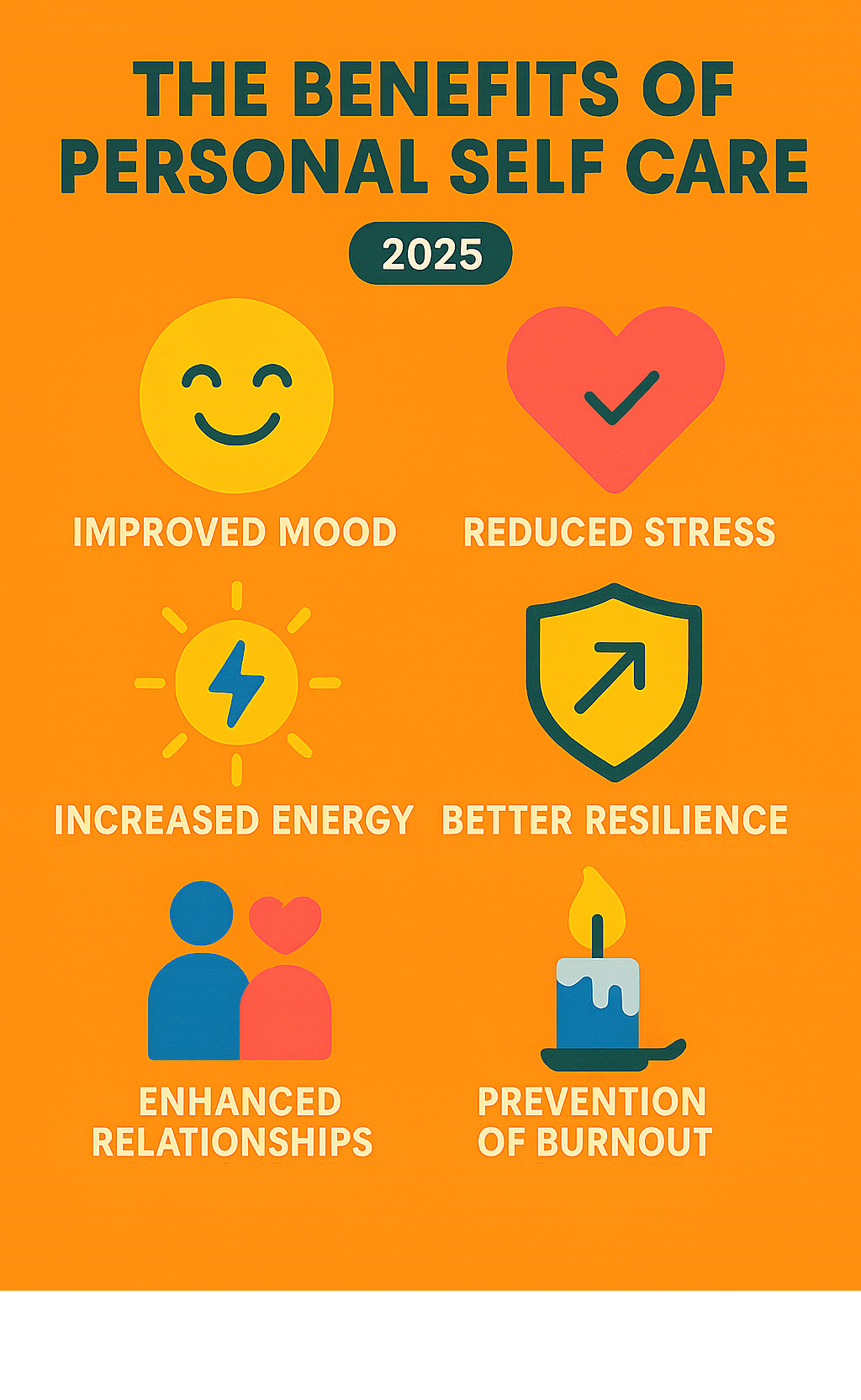Understanding Personal Self-Care
Personal self care often feels like a luxury, but it’s a critical tool for a healthy, balanced life.
So, what is personal self care?
- Definition: It’s the deliberate practice of taking actions to promote your overall well-being, covering your physical, mental, emotional, and spiritual health.
- Importance: It’s crucial for managing stress, preventing burnout, and maintaining balance. Self-care boosts resilience, helping you better handle life’s challenges.
- Practice: It involves purposeful activities custom to your needs, from resting and learning to connecting with others or setting boundaries.
The airplane oxygen mask analogy applies perfectly: put on your own mask before helping others. You can’t pour from an empty cup.
Many people recognize the need for self-care, yet few practice it daily. This gap contributes to stress and burnout, with work-related stress affecting three in five employees and causing issues like lack of interest or energy.
This guide will help you understand personal self care deeply, explore its many forms, and build a plan that fits your life.

Similar topics to personal self care:
What is Self-Care and Why Is It So Important?
Personal self care involves intentional steps to improve your well-being. It’s a continuous process, not just an occasional treat. The World Health Organization (WHO) defines self-care as the ability to promote health, prevent disease, and cope with illness. In our demanding society, self-care is a crucial antidote to stress and burnout. By prioritizing it, you build resilience – the ability to bounce back from adversity – and improve your relationships. Understanding Why Self-Care is Important is the first step to a more balanced life.
The Myth of Selfishness vs. The Reality of Necessity
A common myth is that personal self care is selfish. In reality, it’s a necessity. You can’t effectively care for others if your own tank is empty. Investing in yourself improves your capacity to contribute to your work and relationships. Studies show that self-care boosts professional quality of life and well-being in demanding fields like social work and psychology. It’s a win-win for your overall wellness, which you can explore in The Ultimate Guide to Wellness and Well-being.
The Science-Backed Benefits of a Self-Care Routine
The benefits of a consistent personal self care routine are backed by science. Research shows it can:
- Reduce anxiety and depression by helping manage stress and improve mood.
- Increase happiness and energy by replenishing physical and mental reserves.
- Improve physical health, as practices like good sleep and nutrition boost performance.
- Build resilience to handle life’s stressors without being overwhelmed.
- Boost professional quality of life, with studies on medical students showing that self-care lowers stress and improves well-being.
Self-care is a powerful tool for your overall health and happiness and is integral to Improved mental health.
The 7 Dimensions of Personal Self-Care

When we talk about personal self care, it’s important to understand that it’s not a one-size-fits-all concept. Our well-being is holistic, meaning it encompasses many different facets of our lives. Neglecting one area can impact all the others. To effectively nurture ourselves, we need to consider various dimensions. While some frameworks use eight dimensions, we find it helpful to group them into seven key areas for a comprehensive and balanced approach:
1. Physical Self-Care
This foundational dimension of personal self care is about nourishing your body to give it the energy and health it needs. Think of your body as a vehicle that needs consistent care to run smoothly.
Prioritize 7-9 hours of quality sleep. Create a peaceful bedroom and stick to a consistent sleep schedule to help your body and mind recharge. Next, focus on a healthy diet with whole foods like fruits, vegetables, and lean proteins. What you eat impacts your energy, mood, and skin, as we explore in The Connection Between Gut Health and Glowing Skin. Remember to hydrate with plenty of water.
Regular exercise doesn’t have to be intense. Find an activity you enjoy, like a brisk walk, yoga, or dancing. Even 10 minutes of movement can boost your mood and energy. Incorporate moments of rest and relaxation throughout your day with a quick stretch or deep breathing. Finally, don’t overlook preventative care; regular check-ups are key to maintaining long-term health.
Here are some simple physical personal self care acts to try:
- Stretching for 5 minutes after you wake up.
- Taking a brisk walk on your lunch break.
- Drinking a large glass of water first thing in the morning.
- Unwinding with a warm bath before bed.
- Practicing good personal hygiene daily.
2. Mental Self-Care
Mental self-care is about keeping your mind sharp, curious, and healthy. It’s like a spa day for your brain, helping you stay clear-headed and reduce stress.
Practice lifelong learning by reading a book, listening to a podcast, or taking a class that sparks your curiosity. Another key is mindfulness, or being fully present. Simple practices like meditation or deep breathing can calm a racing mind, and you can even incorporate it into daily routines with our Mindful Skincare Practices. For a fun workout, try puzzles and brain games.
In our always-on world, a digital detox is vital. Stepping away from screens can reduce mental clutter, a topic we cover in Digital Detox: A Wellness Reset for Your Mind and Skin. How you talk to yourself also matters. Practice positive self-talk by replacing negative thoughts with kinder affirmations. Journaling can be a therapeutic way to process thoughts and gain clarity.
Finally, seeking knowledge on topics that interest you keeps your mind vibrant. For more guidance, MedlinePlus offers excellent MedlinePlus tips for mental health. Prioritizing your mental health is a powerful act of personal self care.
3. Emotional Self-Care
Emotional self-care is about creating a healthy relationship with your feelings, acknowledging them without judgment, and finding constructive ways to process them. It means creating safe practices for your emotions to flow naturally.
Journaling is a powerful tool for emotional wellness. Writing honestly about your thoughts can help you identify emotional patterns and gain self-awareness. This practice is a cornerstone of Emotional Self Care.
Setting boundaries is crucial for protecting your emotional energy. This means learning to say no to requests that drain you and stepping away from toxic situations.
Self-compassion is also key. A 2019 study found a strong link between self-compassion and our ability to care for ourselves. When you face a setback, speak to yourself with the same kindness you’d offer a friend.
Don’t underestimate the power of expressing your emotions, whether by talking to a friend, having a good cry, or using creative outlets like painting or dancing. A gratitude practice can also shift your emotional landscape by training your brain to notice the good.
The NIH offers a comprehensive NIH Emotional Wellness Toolkit with more strategies. Seeking support is a sign of wisdom.
4. Social Self-Care
As social beings, our connections play a huge role in our well-being. Personal self care also involves nurturing the relationships that feed our souls. The NIH Social Wellness Toolkit emphasizes how vital these connections are for our health.
Quality time with loved ones is the foundation. It’s about intentional connection, whether it’s a weekly phone call, a coffee date, or a heartfelt text.
Joining communities that align with your interests, like a book club or volunteer group, helps create a sense of belonging and provides a support system.
Learning to ask for help is a powerful form of self-care. Reaching out when you’re overwhelmed is a sign of strength, not weakness.
Setting social boundaries is equally important. It’s okay to limit your exposure to toxic relationships or situations that leave you feeling drained. This includes practicing healthy online engagement by using social media to genuinely connect rather than compare.
The CDC notes that loneliness is linked to serious health risks, but even small steps toward connection make a difference. Volunteering can be a wonderful way to connect with others while giving back.
Social self-care isn’t about popularity; it’s about cultivating relationships that genuinely nourish you.
5. Spiritual Self-Care
Spiritual self-care nurtures your inner essence. This dimension of personal self care is not necessarily about religion but about connecting with your core values and what gives your life meaning and purpose.
One powerful way is through meditation and prayer, which can help you feel connected to something larger than yourself. Another path is spending time in nature, which can inspire awe and peace. Cultivating an attitude of gratitude by acknowledging the good in your life can also profoundly shift your perspective.
Take time for self-reflection to ensure your daily actions align with what you value most. Simple practices like mindful breathing can connect you with your inner self and promote calm, as we explore in The Power of Breathwork for Wellness and Inner Glow. Finally, engaging in acts of service can provide a deep sense of fulfillment and spiritual reward.
6. Financial Self-Care
An often-overlooked dimension of personal self care is financial well-being. Managing your money in a way that reduces stress creates a secure foundation for other areas of your life to flourish.
Feeling in control of your finances boosts security and happiness. Here’s how to practice it:
- Budgeting: Create and stick to a budget to understand where your money is going and make conscious spending choices.
- Paying bills on time: This simple act prevents late fees, protects your credit, and frees your mind from worry.
- Financial literacy: Educating yourself about money management is empowering. A 2022 study found that financial literacy is a better predictor of happiness than income.
- Setting financial goals: Having clear goals, like saving for a trip or retirement, provides motivation and purpose.
- Debt management: Developing a plan to pay down debt can lift a significant mental burden.
- Building an emergency fund: A savings cushion for unexpected expenses provides immense peace of mind and security.
By engaging in these practices, you’re not just managing money; you’re nurturing a crucial part of your overall well-being.
7. Professional Self-Care
Professional self-care is about ensuring your job doesn’t take over your life, helping you avoid burnout and find enjoyment in your work. It’s a key part of your overall personal self care journey.
Finding a work-life balance is crucial. This means creating a clear line between your professional duties and your personal time. Practice this by setting boundaries at work, like saying “no” to extra tasks when you’re swamped and avoiding work emails after hours.
It’s also important to take regular breaks throughout your workday to clear your head and improve focus. Don’t forget to use your vacation time to rest and recharge – it’s vital for gaining a fresh perspective.
Pursuing professional development can also be a form of self-care, making your job more engaging. If you feel overwhelmed, seek support from a supervisor or counselor. This is especially true in demanding fields, as discussed in resources like Self-Care for Mental Health Professionals. Taking care of yourself professionally helps you show up as your best self in all areas of life.
How to Create Your Sustainable Self-Care Plan

Creating a personal self care plan is about making intentional choices to support your well-being, not stuffing more tasks into your schedule. Consistency is more important than intensity. For a helpful tool, check out our Monthly Self-Care Planner Printable Wellness Tracker.
Step 1: Assess Your Current Needs and Practices
Start with self-reflection. Identify your main stressors and your current coping mechanisms, noting which are healthy and which aren’t. Then, assess the seven dimensions of self-care (physical, mental, emotional, social, spiritual, financial, professional), rating each on a scale of 1 to 10. This will highlight areas needing more attention. The University at Buffalo offers a helpful Developing Your Self-Care Plan guide for a deeper dive. Remember to acknowledge what you’re already doing well.
Step 2: Set Small, Realistic Goals
Start small to avoid feeling overwhelmed. Instead of an hour at the gym, begin with a 10-minute daily walk. Small, consistent steps build lasting habits. Find inspiration with our 5-Minute Wellness Tips for Busy Women. Schedule self-care in your calendar to make it a priority. Try “habit stacking” by linking a new practice to an existing one, like meditating for five minutes after your morning coffee. Most importantly, choose activities you genuinely enjoy, so personal self care doesn’t feel like a chore.
Step 3: Overcoming Common Barriers to Personal Self-Care
Even with the best plan, barriers arise. Here’s how to tackle them:
- Lack of Time: Schedule self-care like an important appointment. Even 15 minutes a day makes a difference.
- Feeling Guilty: Shift your mindset. Remember the oxygen mask analogy – caring for yourself enables you to care for others. Self-care is a necessity, not a selfish act.
- Cost: Self-care doesn’t have to be expensive. Many powerful practices are free, such as walking in nature, meditating, journaling, or calling a friend.
- Lack of Knowledge: You’re already solving this by reading this guide. Use what you’ve learned about the seven dimensions to build a plan that works for you.
Step 4: Adapting Your Plan for Different Life Stages
Your personal self care plan should evolve with you. The needs of a student differ from those of a new parent, a busy professional, or a retiree. Be flexible and adjust your routines as your circumstances change. For instance, holidays might require a different approach, as explored in our Holiday Self Care guide. Regularly check in with yourself and ask, “Does this still serve me?” Adapt your plan to fit your current life stage.







